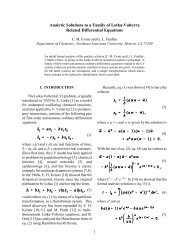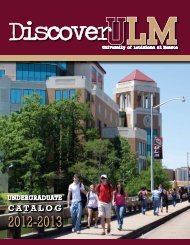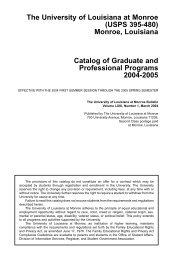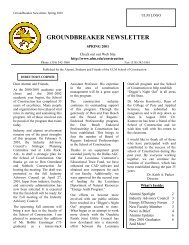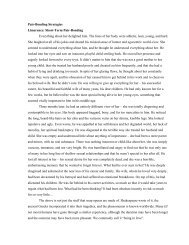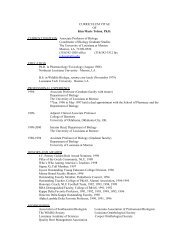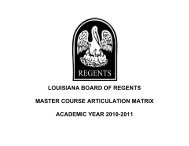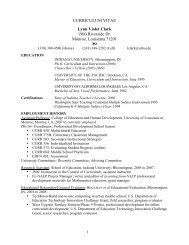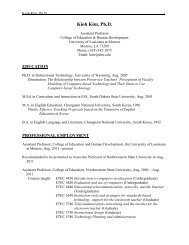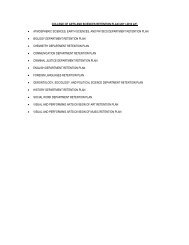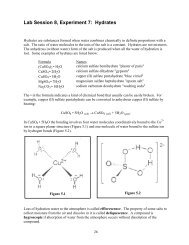08-09 Graduate Catalog/w pics - University of Louisiana at Monroe
08-09 Graduate Catalog/w pics - University of Louisiana at Monroe
08-09 Graduate Catalog/w pics - University of Louisiana at Monroe
You also want an ePaper? Increase the reach of your titles
YUMPU automatically turns print PDFs into web optimized ePapers that Google loves.
GRADUATE COURSES 149<br />
581. ADVANCED TOXICOLOGY. 3 cr. Cellular mechanisms <strong>of</strong> adverse chemical effects in biological<br />
systems. Areas <strong>of</strong> emphasis include principles <strong>of</strong> p<strong>at</strong>hology, genotoxicity, carcinogenicity,<br />
ter<strong>at</strong>ogenicity and toxic responses <strong>of</strong> major organ systems. Prerequisites: 415, 489.<br />
582. ADVANCED TOXICOLOGY LABORATORY. 3 cr. Common labor<strong>at</strong>ory techniques used to<br />
evalu<strong>at</strong>e chemical toxicity. One hour lecture, six hours labor<strong>at</strong>ory. Prerequisite: Credit or<br />
registr<strong>at</strong>ion in 581.<br />
583. SURFACE AND INTERFACIAL PHENOMENA. 3 cr. This course deals with the fundamentals<br />
<strong>of</strong> surface and interfacial phenomena encountered by pharmaceutical scientists in the<br />
development <strong>of</strong> dosage forms.<br />
584. CHEMICAL KINETICS AND STABILITY OF PHARMACEUTICALS. 3 cr. This course deals<br />
with the fundamentals aspects <strong>of</strong> chemical kinetics applied to the stability <strong>of</strong> pharmaceutical raw<br />
m<strong>at</strong>erials and final dosage forms.<br />
590. METHODS AND PRINCIPLES OF TOXICOLOGY. 4 cr. each. Intended to provide the gradu<strong>at</strong>e<br />
student with hands-on labor<strong>at</strong>ory experience in methods commonly used in A. Neurotoxicology,<br />
B. Aqu<strong>at</strong>ic Toxicology, C. Immunotoxicology, D. Hep<strong>at</strong>otoxicology. Prerequisite for A, B, and D:<br />
550 and Consent <strong>of</strong> Instructor. Prerequisite for C: 4<strong>08</strong> or 423.<br />
599. THESIS. 3, 6, 9, 12 cr. Applicable to all disciplines. May be repe<strong>at</strong>ed for credit. Grades <strong>of</strong> CR<br />
(Credit) or NC (No Credit) will be awarded.<br />
651. ADVANCED DIRECTED STUDY. 1-3 cr. Maximum, 10 cr. Applicable to all disciplines.<br />
699. DISSERTATION. 3, 6, 9, 12 cr. May be repe<strong>at</strong>ed for credit. Grades <strong>of</strong> CR (Credit) or NC (No<br />
Credit) will be awarded. Applicable to all disciplines.<br />
PHILOSOPHY<br />
(PHIL)<br />
For Undergradu<strong>at</strong>es and <strong>Gradu<strong>at</strong>e</strong>s<br />
400. INTERSECTIONS OF SCIENCE AND RELIGION. 3 cr. This course will cover the issues th<strong>at</strong><br />
have arisen historically and also in the contemporary world in the dialogue <strong>of</strong> science and<br />
religion. Major focus should be given to how these issues and positions have affected our<br />
understanding <strong>of</strong> human n<strong>at</strong>ure. To<strong>pics</strong> th<strong>at</strong> should be covered include: Darwin and the<br />
Evolutionary Theory, Cre<strong>at</strong>ionism, Design, the Origin <strong>of</strong> the Cosmos, the Big Bang, Quantum<br />
Theory and Chance, the Free Will, Miracles and Prayer, and theories <strong>of</strong> Human N<strong>at</strong>ure in Asian<br />
Religions and Christianity.<br />
401. ANCIENT AND MEDIEVAL. 3 cr. Philosophical thought from the Pre-Socr<strong>at</strong>ic to the sixteenth<br />
century, including Pl<strong>at</strong>o and Aristotle, the Epicureans and the Stoics, the Neo-Pl<strong>at</strong>onists, and<br />
Aquinas; the rise and fall <strong>of</strong> medieval scholasticism.<br />
403. ETHICS. 3 cr. A study <strong>of</strong> the theoretical found<strong>at</strong>ions <strong>of</strong> morality with reference to approaches to<br />
ethical thought, character, and action. Concepts include good and evil, right and wrong,<br />
oblig<strong>at</strong>ions and rights, responsibility and freedom and the applic<strong>at</strong>ion <strong>of</strong> these concepts to the<br />
working out <strong>of</strong> particular ethical problems. (Same as Govm 403.)<br />
404. CONTROVERSIAL ISSUES IN BIOETHICS. 3 cr. The ethical significance <strong>of</strong> and ethical<br />
dilemmas th<strong>at</strong> arise as a result <strong>of</strong> new cutting edge biotechnologies. Ethical to<strong>pics</strong> include:<br />
reproductive options, abortion, stem-cell research, human cloning, genetic discrimin<strong>at</strong>ion and<br />
confidentiality, genetic engineering, regul<strong>at</strong>ion <strong>of</strong> human research, and euthanasia.<br />
405. PHILOSOPHY OF RELIGION. 3 cr. A study <strong>of</strong> <strong>at</strong>tempts to bring r<strong>at</strong>ional justific<strong>at</strong>ion and<br />
clarific<strong>at</strong>ion to religious beliefs and practices, focusing primarily on the concepts <strong>of</strong> Christian<br />
theology. To<strong>pics</strong> will include the existence <strong>of</strong> n<strong>at</strong>ure <strong>of</strong> God, faith and reason, de<strong>at</strong>h and<br />
immortality, mysticism, the problem <strong>of</strong> evil, religious experience, and the impact <strong>of</strong> existentialism<br />
on contemporary religious thought.<br />
407. THEORIES OF HUMAN NATURE. 3 cr. This course will cover the theories <strong>of</strong> human n<strong>at</strong>ure th<strong>at</strong><br />
have arisen historically and also in the contemporary world. Major figures to be covered include<br />
Pl<strong>at</strong>o, Aristotle, Aquinas, Hobbes, Locke, Hume, Kant, Darwin, Marx, Nietzche, Freud, Sartre,<br />
Maslow, and contemporary psychological theories. This course will answer questions like wh<strong>at</strong><br />
is the human being?, wh<strong>at</strong> is the purpose <strong>of</strong> human life?, is the human being basically<br />
aggressive or kind?, and how do human beings differ from animals?<br />
491. DIRECTED STUDY. 1-3 cr. Directed study and/or research in selected areas <strong>of</strong> philosophy. A.<br />
Logic; B. Ethics; C. Ancient, Medieval, and Modern; D. Theory <strong>of</strong> Knowledge. Prerequisite:<br />
Advanced standing, approval <strong>of</strong> department head, and permission <strong>of</strong> the instructor.



